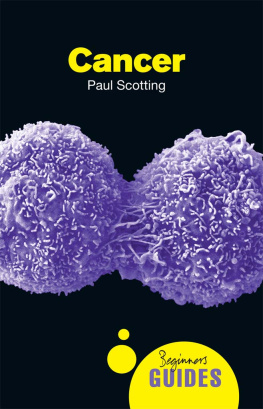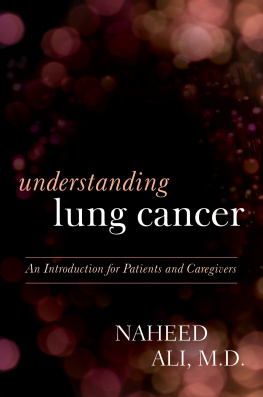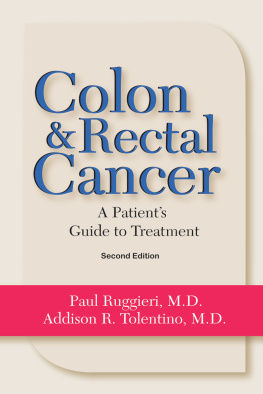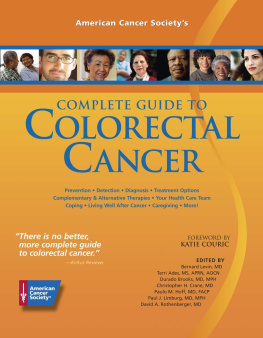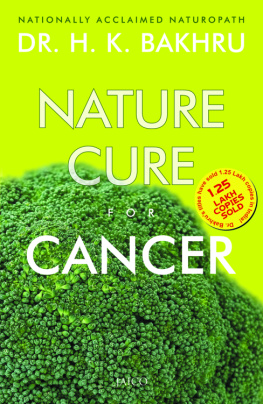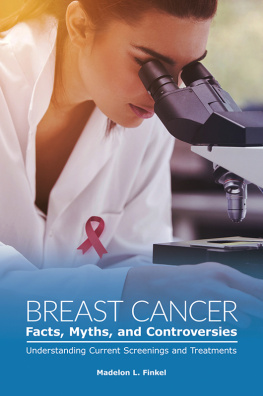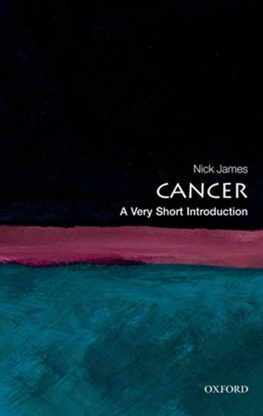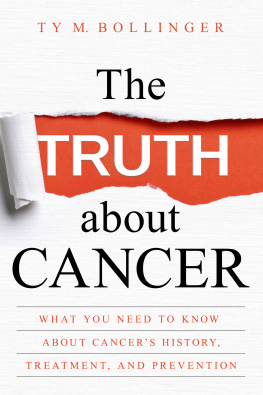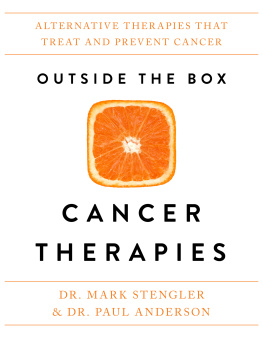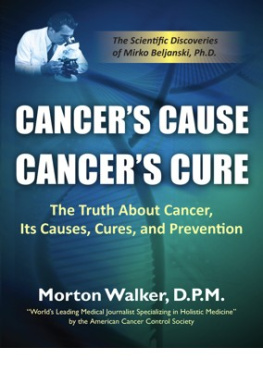Cancer
A Beginners Guide
ONEWORLD BEGINNERS GUIDES combine an original, inventive, and engaging approach with expert analysis on subjects ranging from art and history to religion and politics, and everything in between. Innovative and affordable, books in the series are perfect for anyone curious about the way the world works and the big ideas of our time.
africa
anarchism
aquinas
artificial intelligence
the bahai faith
the beat generation
biodiversity
bioterror & biowarfare
the brain
british politics
the buddha
cancer
censorship
christianity
civil liberties
classical music
climate change
cloning
cold war
conservation
crimes against humanity
criminal psychology
critical thinking
daoism
democracy
descartes
dyslexia
energy
engineering
the enlightenment
epistemology
evolution
evolutionary psychology
existentialism
fair trade
feminism
forensic science
french revolution
genetics
global terrorism
hinduism
history of science
humanism
islamic philosophy
journalism
judaism
lacan
life in the universe
literary theory
machiavelli
mafia & organized crime
magic
marx
medieval philosophy
middle east
NATO
nietzsche
the northern ireland conflict
oil
opera
the palestine-israeli conflict
paul
philosophy of mind
philosophy of religion
philosophy of science
postmodernism
psychology
quantum physics
the quran
racism
renaissance art
the small arms trade
sufism


A Oneworld Book
Published by Oneworld Publications 2010
Copyright Paul Scotting 2010
This ebook edition published by Oneworld Publications 2012
The moral right of Paul Scotting to be identified as the Author of this work has been asserted by him in accordance with the Copyright, Designs and Patents Act 1988
All rights reserved
Copyright under Berne Convention
A CIP record for this title is available from the British Library
print ISBN 9781851687558
ebook ISBN 9781780741376
Typeset by Jayvee, Trivandrum, India
Cover design by vaguelymemorable.com
Oneworld Publications
185 Banbury Road, Oxford OX2 7AR, England
Learn more about Oneworld. Join our mailing list to find out about our latest titles and special offers at:
www.oneworld-publications.com
Acknowledgements
This book arose as a direct result of teaching a module in Cancer Genetics at the University of Nottingham with my colleagues Matt Loose and Jane Hewitt. I therefore owe a debt of gratitude to them, and to the many students who have gone through that course, for the pleasure and inspiration they have provided.
Having convinced myself that there was indeed a book to be written, my long-term colleague Ian Duce encouraged me to take it on, so he deserves a special mention along with my thanks to him, his wife Glenys and his daughter Carrie for reading an early draft.
Thanks to Andreas Leidenroth, Nicki Challenger, Annie Houldey, Helen Fielding and Trevor Ross-Gower, who all read the manuscript at various stages of completion and provided critical insights. My friend, Alison Symonds, merits special mention as my harshest critic, who, like my daughter, interpreted her task as teaching me English. Without them there would have been almost as many commas as there are words. Thanks to Susan Cleator and Carlo Palmeari for advice about breast cancer treatments and to Nick Bown for the images of chromosomes from normal and cancerous cells. I would like to make a special mention of Penny Howard (School of Nursing, Midwifery and Physiotherapy, Queens Medical School, Nottingham). Penny provided excellent advice on clinical matters and enthusiastic support for the project and she, above all others, contributed directly to the scientific content, especially in Chapters 13 and 14.
I would like to thank Marsha Filion for so readily accepting this project for Oneworld Publications and for her reconstruction of my early efforts, and Mike Harpley for his help in the latter stages.
I must also thank my friends and colleagues in the Nottingham Childrens Brain Tumour Research Centre. In particular, I thank David Walker and Jonathan Punt, for aiding and abetting my forays into the field of childrens cancer research and Beth Coyle, a valued colleague with whom to discuss my ideas on childrens cancer. Through them I met Giorgio Perilongo, who convinced me that my ideas about cancer might be of some interest to others.
I would like to credit the charities the Samantha Dickson Brain Tumour Trust, Alis Dream, Charlies Challenge and the Nottingham Childrens Brain Tumour Research Centre without whom I would never have been able to direct my fascination with cancer cells into real research. Also, thanks to Isabella Hildyard and her family for their support and encouragement in the early days of my research into childrens brain tumours. Likewise, I would not have been able to carry out any of this work without the many students and researchers who have worked with me in my lab and those with whom I have collaborated.
I must especially thank my wife, Jane, and my kids, Oscar, Flo and Bertie, who not only read various drafts of the book but also put up with endless heres another interesting fact about cancer interjections at the dinner table.
Finally, clich though it is, I want to thank my mum, Marion Scotting. Having read the manuscript, she described it as a page turner. Biased though her opinion may be, I did not expect that it would achieve such an accolade, even from my own mother. The book is dedicated to her, because my success is her success and so this book is as much her achievement as it is mine.
Introduction
Cancer is one of the most common life-threatening diseases of the modern world. Of all the potentially fatal diseases we are likely to encounter, cancer is second only to heart disease, killing one in four people in the West. We will all come into contact with it, either personally, or as bystanders if friends and family are diagnosed with one of its different forms. And although many cancers are almost entirely curable with minimal therapy, this is not true of all of them. But do most of us really understand what cancer is?
We all know that cancer usually appears as a lump, an unwanted growth, called a tumour. We know it can appear in almost any part of the body. We know that treatments for cancer can cause unpleasant side-effects and that they do not always succeed in ridding us of the disease. However, most of us really have very little idea of the true nature of cancer. A clear insight into the biology of cancer is essential for scientists and clinicians but I believe we can all deal better with the consequences of cancer if we really understand what it is.
For many, cancer is seen as an alien intent on our destruction. It grows inside our bodies, eventually overwhelming our life-support systems. Its purpose is to destroy us, for its own benefit. While this would be a good description of many diseases, it is not a fair portrait of cancer. The drug-resistant superbug, Methicillin-Resistant Staphylococcus Aureus (MRSA), which lurks in our hospital wards, is indeed such an alien invader. It does attempt to destroy us for its own benefit and moves on to a new host at the first opportunity. Viruses, for example the Human Immunodeficiency Virus, HIV (which causes AIDS), are even more sinister in their behaviour. They invade us, enter the bodys cells and use the cells own machinery to provide the building blocks they need to replicate themselves before they leave the body and spread to another victim. Their hosts demise is of no consequence to them; viruses have evolved to feed upon us for the good of their own kind.

